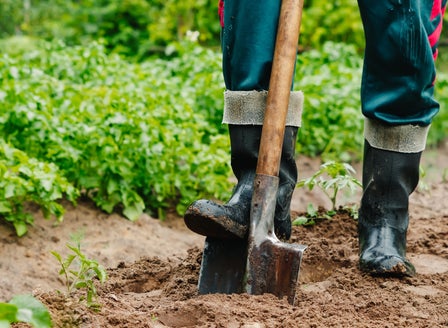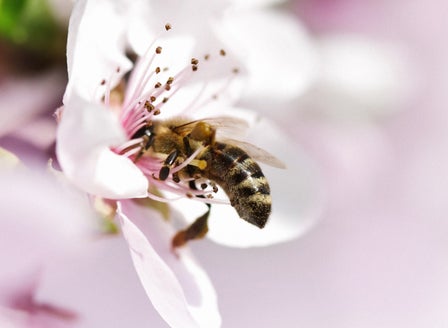Leptospermum, commonly known as manuka is popular for its colourful flowers throughout winter and spring. This hardy plant has been bred for its ornamental value in home gardens with flowers in pink, white or red, against contrasting bronze foliage. Great for coastal or windy sites, native borders and can also be grown in containers. Great for attracting bees to the garden and is one of the main sources of nectar for Manuka honey.
Planting Calendar
The best time to plant Manuka is and spring/ summer and autumn.
Prepare
Position
Mānuka is tolerant of almost all growing conditions including the harshest wetlands, geothermal areas, dry exposed ridges and coastlines. They can be grown in full sun to partial shade
Soil
When planted into the ground Manuka does best in a free draining soil that is rich in organic matter. To improve the organic content in your soil, break up the soil and add Kings Compost and Kings Sheep Pellets then mix together well. When growing in containers, plant into Kings Container mix. This mix contains added water storage crystals and Saturaid, two products that help maintain moisture in the soil.
Plant
When planting into the ground, gently tap the plant out of its pot. Dig a hole twice the depth and width of the plants root ball. Mix Kings Compost into your existing soil at a 50/50 ratio, add Sheep Pellets and Kings 24 plus fertiliser, then mix together well. Back fill the hole with this soil, so that when planted the top of the plant’s roots sit level with the surrounding ground. Firm the soil down gently and water in well with Aquaticus Organic Garden Booster. In heavier clay soils, where drainage is likely to be an issue, plant onto a raised mound and sprinkle Gypsum Clay Breaker into the bottom of the hole, this helps slowly condition the soil and will help to break down the clay. When planting into containers plant in Kings Containers mix, as this has water retention crystals in it, which will help in keeping the soil moist. Firm the soil down gently and water in well with Aquaticus Organic Garden Booster.
Care
Watering
Watering is essential especially in the first year of planting to allow the roots to get well established. Water slowly allowing the water to sink down into the roots, rather than allowing it to run off the top of the soils surface. Add Saturaid into the soil at planting as this will help channel the water deep down into the root zone. If planted in pots never allow the pot to sit in water.
Feeding
When planted in the ground liquid feed every month with Aquaticus Garden Booster, from Spring through to the end of Autumn, this encourages root growth and increases the microbial activity in the soil. Monthly applications of Kings Sheep Pellets will help with soil conditioning and plant health. If planted into a container feed with Kings Liquid Fast Food along with monthly applications of Aquaticus Organic Garden Booster this encourages strong roots and a healthy immune system.
Mulching
Mulch around the base of the plants (make sure that the mulch does not come into direct contact with the stem of the plant) with Living Earth More than Mulch. Mulching helps to reduce weeds as well as aiding the soil to retain moisture.
Spraying
Manuka are prone to Scale insect causing sooty mold to grow. Spray with Aquaticus Bugtrol as per instructions for control.
Pruning
Generally Manuka do not need pruning. Prune only to remove dead wood and to shape.
General Care
When using sprays, chemicals or fertilisers always read the label and follow the instructions. Apply sprays in the evening to avoid harming beneficial insects.
Expert Tip
Sooty mould is a black fungus that grows on honeydew (a sticky substance excreted be scale insect). Treat the scale insect to control Sooty Mould. Keep a close eye out for ants on your plants, this is a sure sign that there are scale insect present.
Top Varieties
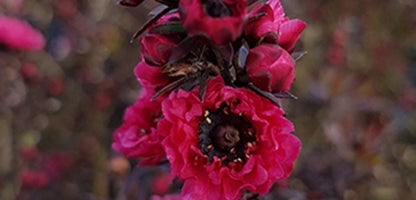
Leptospermum Burgundy Queen
With its bronze red foliage that contrasts with its double deep burgundy flowers this beauty will make a stunning show. Growing to 2m.
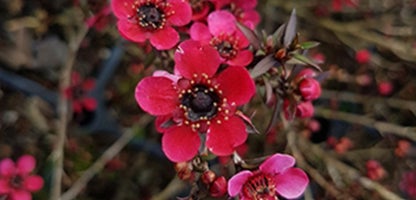
Red Falls
Great for cascading over walls or as a ground cover. Adorned with single red flowers set off against re-green foliage. Growing to 30cm x 1m.
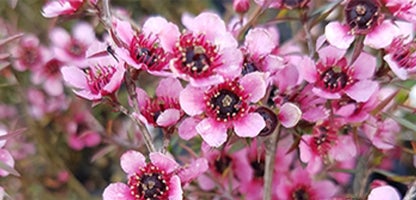
Huia
Perfect for containers due to it small size of 50cm. Huia has dark green foliage and large rose pink flowers.
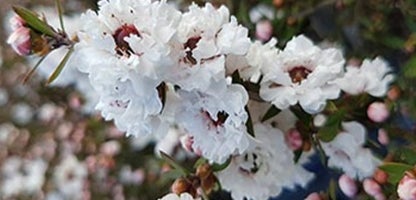
Snow Flurry
With masses of double white flowers and green foliage Snow Flurry will grow to 3m if left untrimmed. This variety is great for hedging.
Frequently Asked Questions
What is Manuka, and where does it grow best?
Manuka, also known as Leptospermum scoparium, is a native New Zealand shrub known for its attractive flowers and medicinal honey. Mānuka is tolerant of almost all growing conditions including the harshest wetlands, geothermal areas, dry exposed ridges and coastlines. They can be grown in full sun to partial shade
How do I plant Manuka?
When planting into the ground, gently tap the plant out of its pot. Dig a hole twice the depth and width of the plants root ball. Mix Kings Compost into your existing soil at a 50/50 ratio, add Sheep Pellets and Kings 24 plus fertiliser, then mix together well. Back fill the hole with this soil, so that when planted the top of the plant’s roots sit level with the surrounding ground. Firm the soil down gently and water in well with Aquaticus Organic Garden Booster.
How often should I water my Manuka plant?
Watering is essential especially in the first year of planting to allow the roots to get well established. Water slowly allowing the water to sink down into the roots, rather than allowing it to run off the top of the soils surface. Add Saturaid into the soil at planting as this will help channel the water deep down into the root zone. If planted in pots never allow the pot to sit in water.
How do I prune Manuka?
Generally Manuka do not need pruning. Prune only to remove dead wood and to shape.
When does Manuka bloom?
Manuka typically blooms in late spring to early summer, producing masses of white, pink, or red flowers. In Auckland, you can expect flowering from October to January.
